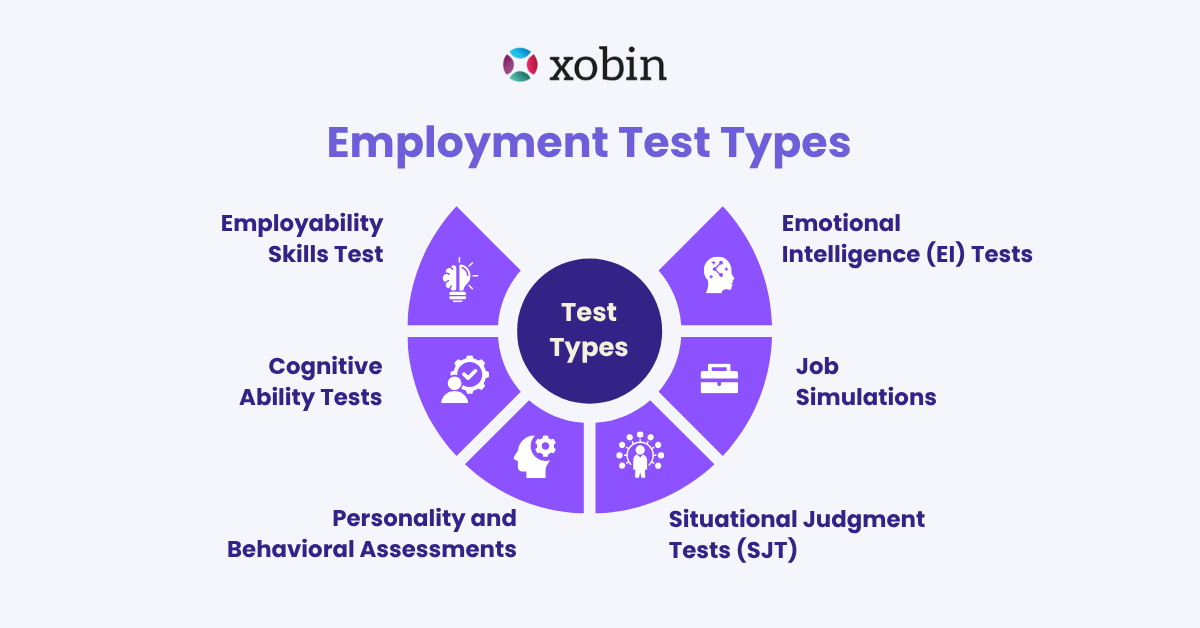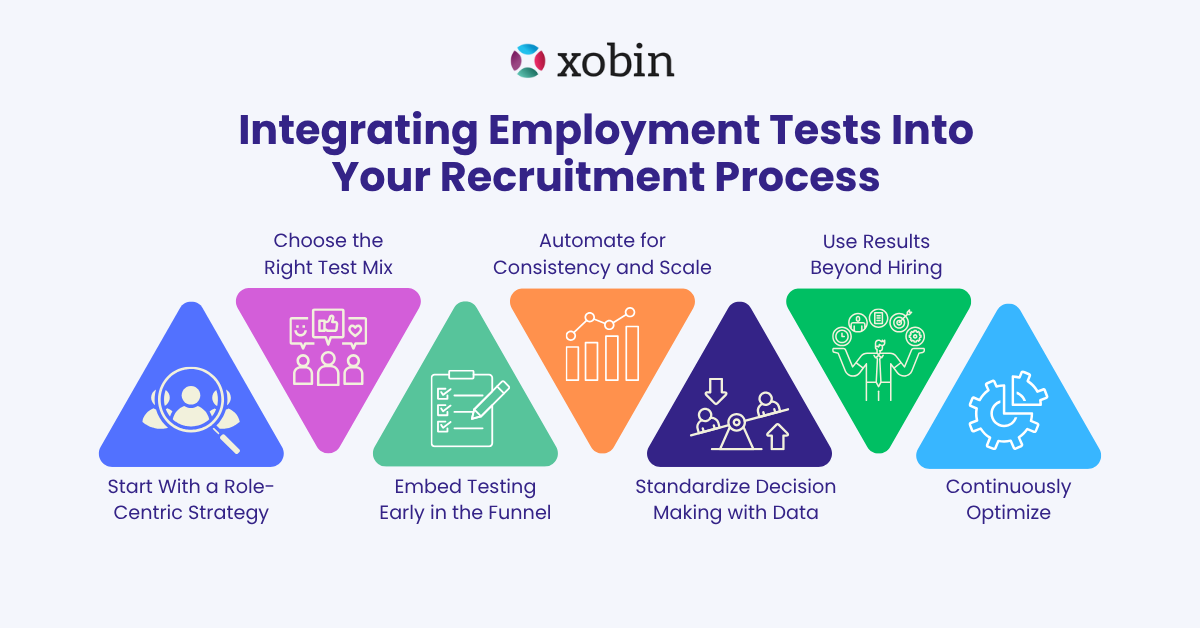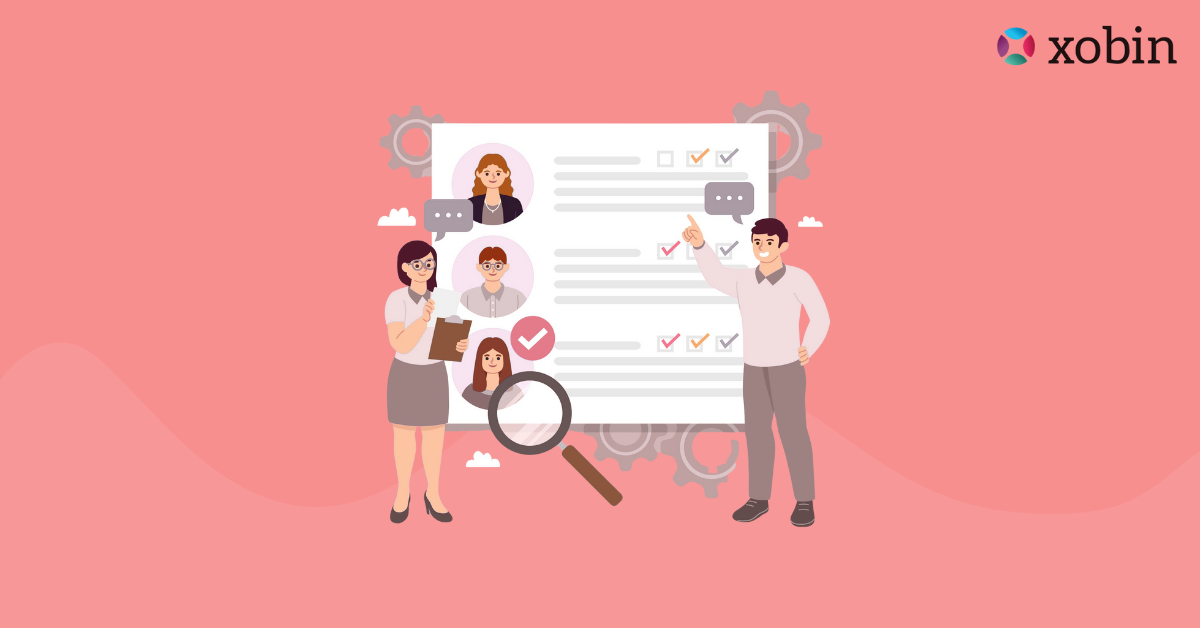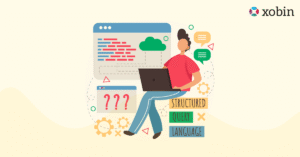Hiring the wrong candidate can cost more than just money; it hinders growth, drains productivity, and derails team performance. Gut feelings are insufficient in today’s high-stakes hiring environment. That’s why companies are turning to employment assessment, a smart, data-driven way to ensure every hire drives business forward. Ready to transform hiring? Let’s dive in!
Table of Contents
TL;DR – Key Takeaways!
- Employment assessments provide objective, data-driven insights into candidate skills, behavior, and job fit beyond resumes and interviews.
- These tests help predict future job performance, align talent with strategic goals, and reduce hiring risks.
- Key employment test types include cognitive ability, personality, situational judgment, job simulations, and employability skills assessments.
- Companies use these tests to reduce bad hires, unlock hidden talent, quantify soft skills, improve retention, and build high-performing teams.
- Integrating employment tests early in recruitment boosts efficiency, reduces bias, and standardizes hiring decisions across roles and locations.
- Modern platforms like Xobin offer AI-powered test creation, advanced AI proctoring, real-time analytics, and seamless ATS integration to streamline hiring.
- Forward-thinking leaders leverage employment assessment tests as strategic tools for workforce planning, succession, and continuous talent development.
What is an Employment Assessment Test?
An employment assessment is a standardized evaluation used to determine if a candidate is qualified for a specific job role. These tests provide clear and unbiased data about a candidate’s skills, thinking abilities, personality, and job-related strengths. Rather than relying solely on resumes and interviews, assessments give organizations deeper insights into a candidate’s potential performance and cultural fit.
The purpose is to reduce hiring risks by ensuring candidates possess the right combination of technical skills, employability skills, and behavioral characteristics needed to excel. These tests often complement other recruitment tools by offering quantifiable insights that reduce the risk of bad hires and improve workforce quality. For example, by integrating a pre-employment test into the selection process, you gain clarity beyond what interviews alone can offer.
Key features of an employment assessment include:
- Objective measurement of candidate attributes
- Ability to evaluate both hard and soft skills
- Standardized format to ensure fairness
- Support for multiple job roles and industries
By implementing pre-employment testing into recruitment, companies can make evidence-based hiring decisions, saving time, reducing bias, and increasing employee retention.
Example of an Employment Assessment
Let’s look at a practical example to illustrate how an employment assessment works.
Consider a fast-growing fintech firm hiring for a product manager. A resume might list qualifications, but can it show:
- Strategic thinking?
- Prioritization under pressure?
- Stakeholder management?
- Cross-functional leadership?
Besides reviewing resumes and conducting interviews, they administer an employability skills assessment test for Product Manager. It might include:
- A situational judgment test simulating product decisions
- A cognitive test measuring analytical reasoning
- A personality assessment ensuring collaboration alignment
Candidates complete the assessment online. The system then scores responses, highlighting strengths and areas for improvement. Hiring managers use this data to shortlist candidates who demonstrate key competencies aligned with the role.
Similarly, a software company might use skills testing for employment to evaluate the programming proficiency, coding speed, and logical reasoning of developer candidates. This technical evaluation ensures candidates meet the required standards before moving to the interview stage.
Such targeted assessments help organizations filter candidates more effectively and focus resources on those most likely to succeed.
Understanding Employment Test Types
Executives face one recurring challenge in hiring: ensuring consistent quality across roles and geographies. That’s why understanding the various types of employment tests is essential. Each type serves a distinct purpose and helps de-risk your hiring process by measuring what interviews often miss.

Here’s a breakdown of the most widely used assessments and the strategic value they bring to the table:
1. Employability Skills Test
Also known as an employability skills assessment test, these evaluate essential soft/power skills like communication, time management, adaptability, and critical thinking. They are especially useful for early-career hires or fresh graduates.
Use Case: Campus hiring, internships, entry-level positions, and workforce readiness programs.
2. Cognitive Ability Tests
These tests measure a candidate’s reasoning, memory, problem-solving, and learning agility. Ideal for roles requiring analytical thinking, adaptability, or rapid upskilling, cognitive tests often predict job performance more accurately than resumes or degrees.
Use Case: Tech, finance, strategy, and innovation roles where mental agility is key.
3. Personality and Behavioral Assessments
These tests assess emotional stability, motivation, sociability, and work style. Cultural fit and temperament can be as critical as skill for leadership roles. Behavioral assessments reveal how a person might engage with teams, clients, or crises.
Use Case: People management, cross-functional leadership, and client-facing roles.
4. Situational Judgment Tests (SJT)
Candidates are presented with real-world job scenarios and must select the most appropriate responses. These tests evaluate decision-making, ethics, conflict resolution, and prioritization, skills that interviews may not surface.
Use Case: Customer service, middle management, compliance, and healthcare.
5. Job Simulations
These immersive tests for recruitment replicate real job tasks. Candidates may be asked to complete a short project, respond to emails, or solve a client case study. Simulations measure practical readiness and how well the candidate handles job-specific challenges.
Use Case: Product management, technical support, creative, and consulting roles.
6. Emotional Intelligence (EI) Tests
Assess how candidates manage their own emotions and relationships. High EI often correlates with better leadership, reduced turnover, and stronger interpersonal dynamics.
Use Case: Executive hiring, HR, sales, and leadership development programs.
Why Are Organizations Using Employment Assessments?
Below are key reasons why smart and future-focused companies are now using employment assessment as a core part of their hiring strategy.
1. Forecasting Future Performance, Not Just Fit
Traditional interviews assess past achievements. But business isn’t won in hindsight. Employment assessment tests give leaders predictive data on how candidates will perform in real-time scenarios. It’s not about who they were but who they will be in your environment.
2. Aligning Talent with Strategic Objectives
Every role has implications for growth, innovation, and risk. Using pre-employment assessment tools, executives can match candidates to specific business goals like market expansion, turnaround management, or digital transformation rather than generic job descriptions.
3. Creating a Data-Rich Hiring Ecosystem
Every completed employment exam becomes a valuable data point. Over time, this creates a proprietary internal talent database enabling more innovative workforce planning, predictive attrition modeling, and even internal mobility forecasting.
4. Quantifying Soft Skills for Cultural Agility
Soft skills like adaptability, resilience, and collaboration are notoriously hard to measure yet vital in dynamic markets. Modern employment assessment tests quantify these intangibles, helping leaders build teams that can pivot quickly and maintain high performance through change.
5. Unlocking Hidden Talent Pools
Traditional hiring often overlooks candidates from non-traditional backgrounds or with diverse experiences. By using objective, skills-based assessments, organizations open the door to untapped talent pools, boosting innovation and inclusivity, both critical for sustainable growth.
6. Enabling Data-Driven Succession Planning
Good succession plans rely on more than tenure and intuition. With robust employee skills assessment data, executives can identify high-potential employees early, design personalized development plans, and reduce leadership gaps before they impact business continuity.
7. De-Risking Executive and Critical Hires
The higher the position, the greater the risk of a hiring mistake. For C-level or business-critical roles, employment assessment tests act as an objective layer of due diligence. They help reduce biased hiring decisions while safeguarding company culture, financial resources, and business continuity.
8. Solving the “Great Culture Fit” Dilemma
Cultural fit is often reduced to subjective judgment. However, with behavioral and employability tests, culture alignment becomes measurable and rooted in shared values, not vague impressions. This helps create resilient, high-trust teams.
9. Uncovering Hidden Talent Pools
Bias, pedigree, and traditional filters often overlook high-potential individuals. Skill-first hiring assessment tests democratize opportunity, surfacing talent from non-traditional backgrounds who can outperform in role-specific tasks.
10. Proving HR’s ROI to the top executives
HR now takes on a strategic role, not just a support function. Using insights from employee skills assessments, HR leaders can clearly show how smart hiring decisions lead to better retention, higher productivity, and drive profits. As a result, this data gives HR a stronger voice in key business strategy discussions.
11. Reducing Legal Risks and Ensuring Compliance
When implemented correctly, employment assessment helps companies comply with equal opportunity laws and reduces legal risks associated with biased hiring decisions. This protects your brand and builds trust with stakeholders.
12. Driving Continuous Improvement in Talent Acquisition
Employment assessments provide actionable insights into your recruitment process. By analyzing test data trends, hiring managers can continuously refine job requirements, interview approaches, and onboarding strategies, turning talent acquisition into a strategic advantage.
Integrating Employment Tests Into Your Recruitment Process
For top leaders focused on optimizing talent acquisition, integrating employment assessments into your recruitment process is not merely an HR initiative; it’s a strategic enabler of performance, culture alignment, and cost efficiency.

The real value lies in embedding employment tests seamlessly at key decision points throughout the hiring lifecycle. Here’s how:
1. Start With a Role-Centric Strategy
Identify high-impact roles where quality of hire directly affects business outcomes. Think about leadership, sales, product, or customer-facing functions. For each, define measurable competencies using data, not assumptions.
2. Choose the Right Test Mix
Xobin helps you choose the right employment assessment test based on the job role. You can select from cognitive ability tests, technical simulations, or behavioral evaluations. For instance, emotional intelligence and situational judgment tests work well for leadership roles. On the other hand, tech positions may need tests for employability skills like coding, teamwork, and problem-solving.
3. Embed Testing Early in the Funnel
Leverage pre-employment assessments as part of the initial application or screening phase. This filters unqualified candidates automatically, reducing recruiter workload and speeding up time-to-hire.
4. Automate for Consistency and Scale
Use an AI-powered platform like Xobin to send tests, handle workflows, and monitor results. At the same time, keep your tests secure with remote proctoring. Integration with your current ATS ensures smooth hiring with little to no disruption.
5. Standardize Decision-Making with Data
Rather than relying solely on subjective interviews, use employment exam scores and insights to inform final decisions. This ensures consistency across locations, roles, and hiring teams.
6. Use Results Beyond Hiring
Assessment data also supports onboarding, learning paths, and internal mobility decisions. Turn every employment test into a long-term asset for talent development and succession planning.
7. Continuously Optimize
Monitor hiring performance post-assessment. Are top scorers excelling? Are hiring managers satisfied? Use these insights to calibrate test difficulty, duration, and scoring thresholds for future cycles.
Getting Started with Xobin’s Employment Testing
Today’s executive teams demand speed and precision in hiring. That’s why Xobin helps organizations transform their hiring process into a powerful edge using smart, scalable employment assessments.
What sets Xobin apart is its ability to bridge the gap between traditional recruitment and data-driven talent assessment without adding complexity.
Here’s how Xobin aligns with your strategic hiring priorities:
- Role-based test library with over 3400+ skills tests and 2500+ job role-based tests
- Custom test builder using AI to match your job description
- Cheat-proof advanced AI proctoring features to ensure test integrity
- Real-time analytics and ranking for fast decision-making
- Remote-friendly experience ensuring inclusivity and accessibility
- Seamless Integration with ATS and Workflows
- Multi-user collaboration for hiring panels and Talent acquisition teams
Xobin doesn’t just evaluate employees during employment; it empowers leadership teams to hire with foresight, consistency, and speed. That’s what makes it a true strategic partner in workforce transformation. Book a personalized demo today!






